新概念英语第一册 Lesson 73-74 课件(共43张PPT)
文档属性
| 名称 | 新概念英语第一册 Lesson 73-74 课件(共43张PPT) | 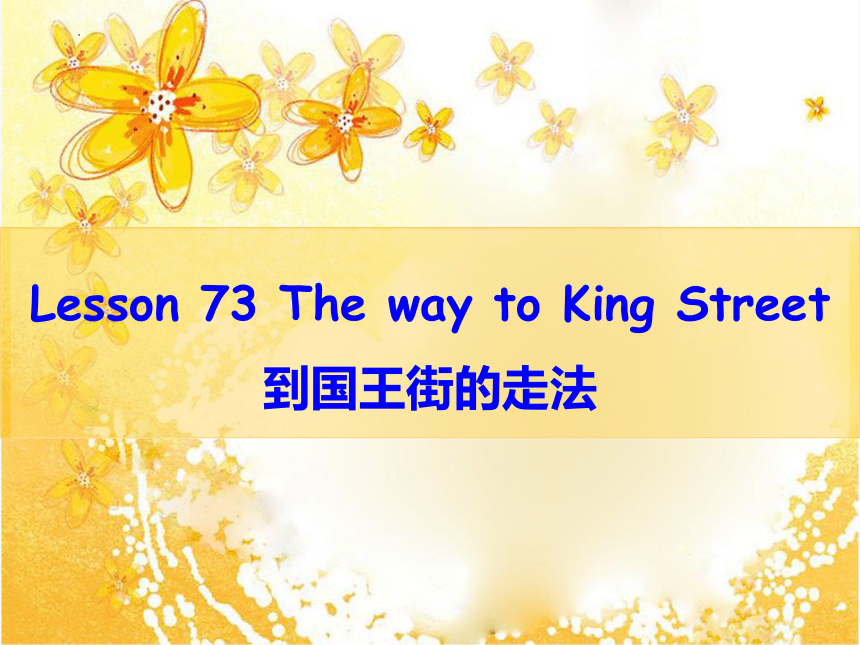 | |
| 格式 | pptx | ||
| 文件大小 | 7.7MB | ||
| 资源类型 | 教案 | ||
| 版本资源 | 新概念英语 | ||
| 科目 | 英语 | ||
| 更新时间 | 2024-07-30 09:54:54 | ||
图片预览

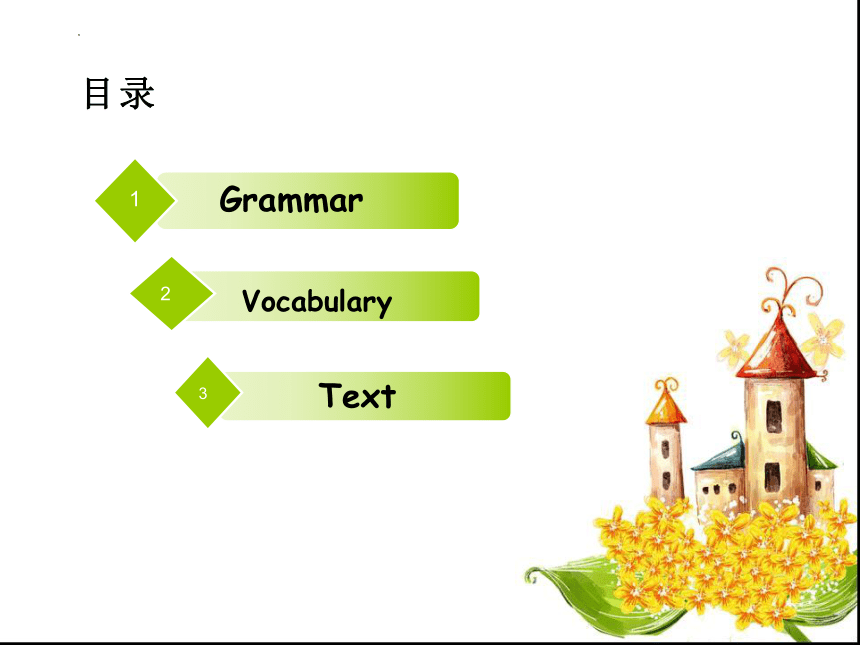
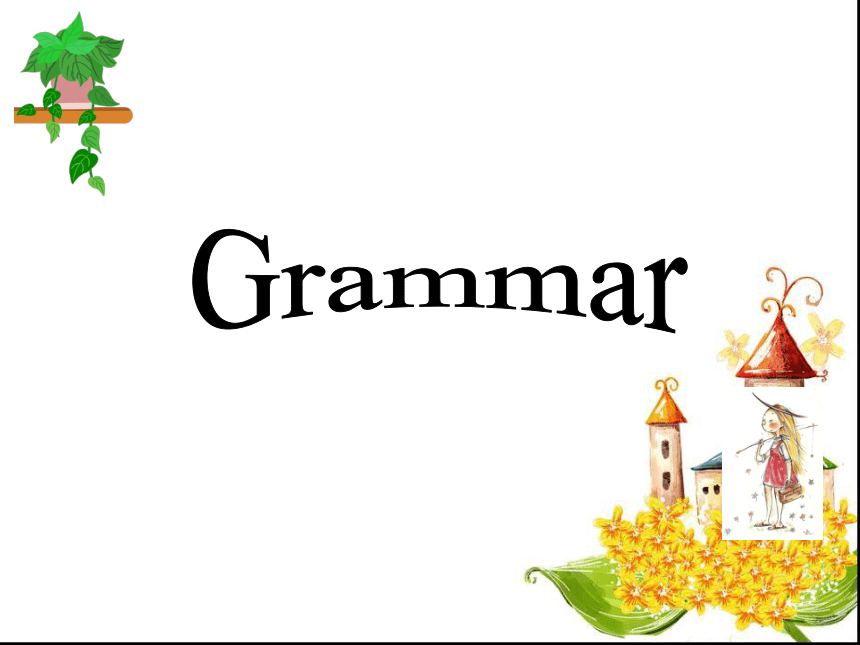
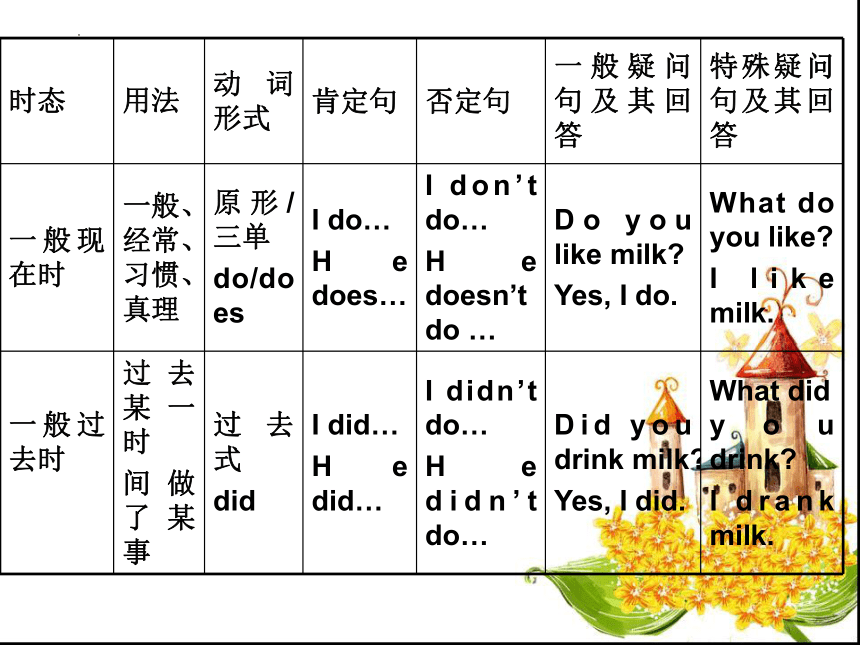
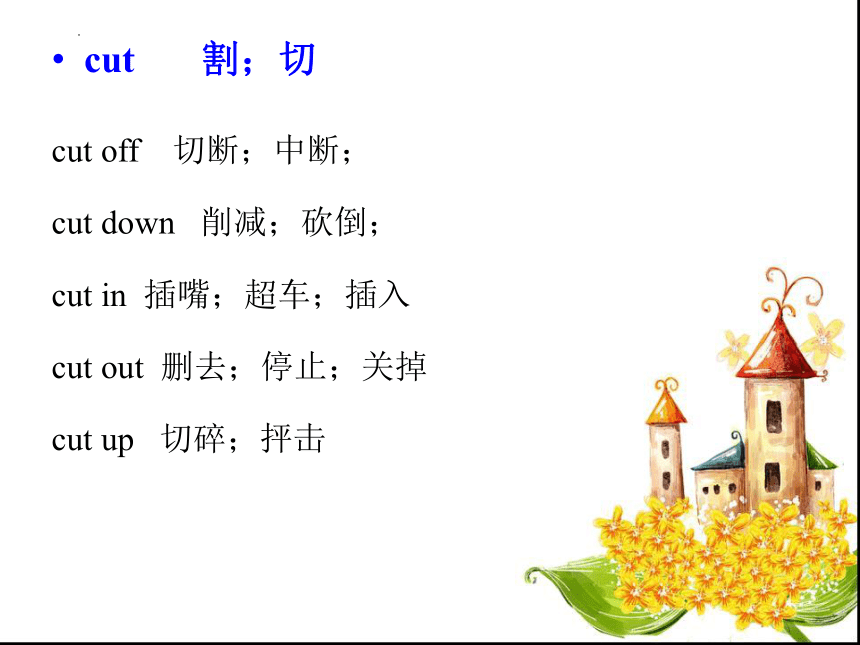
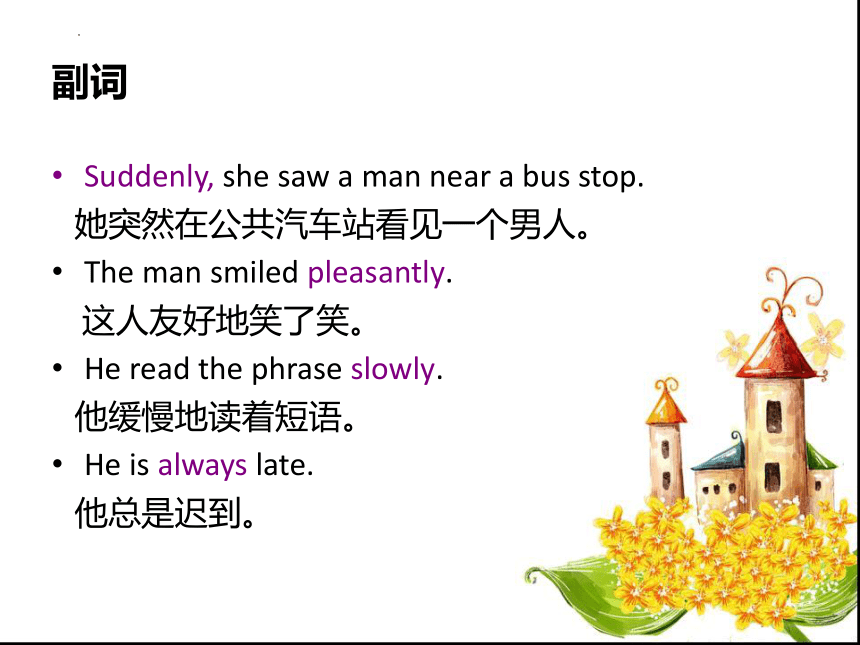
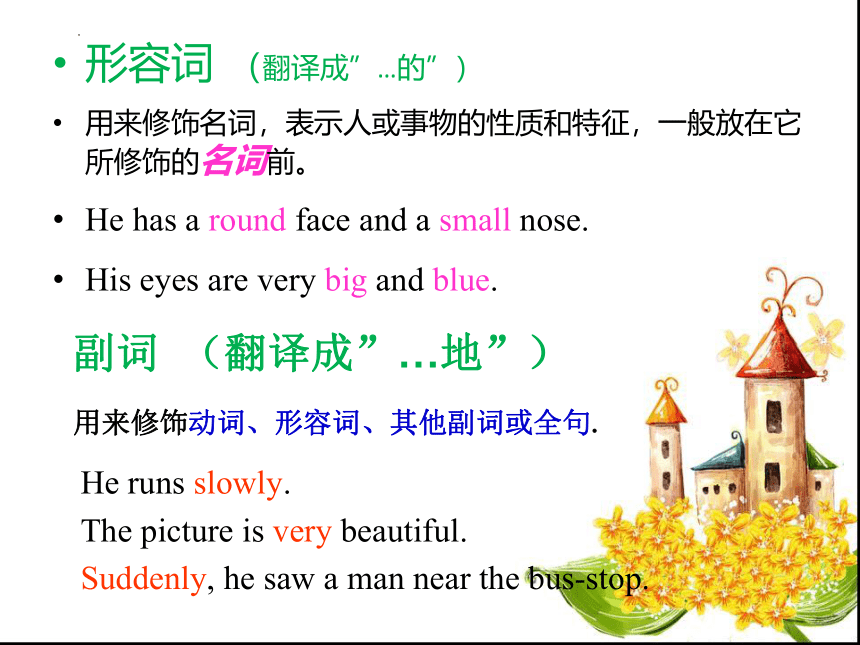
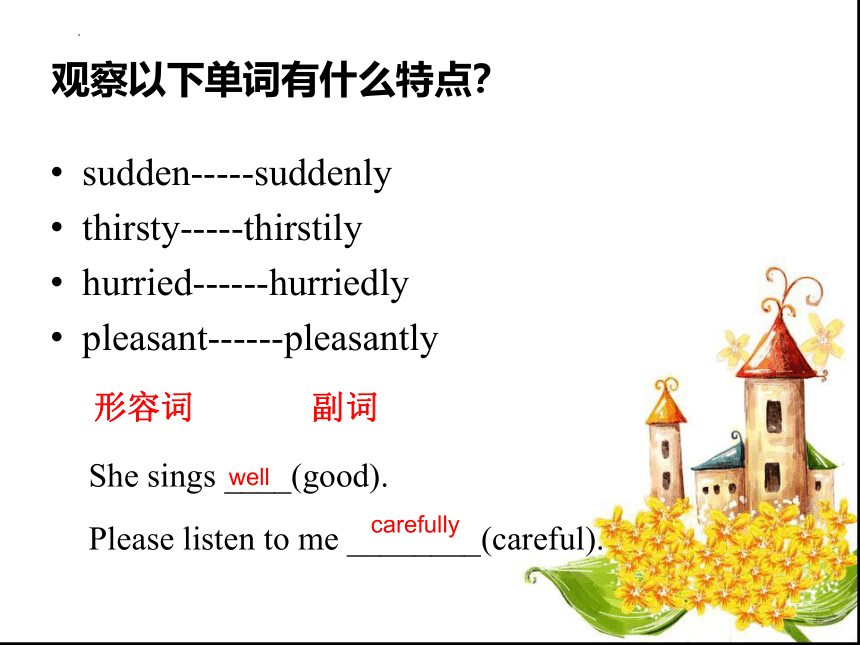
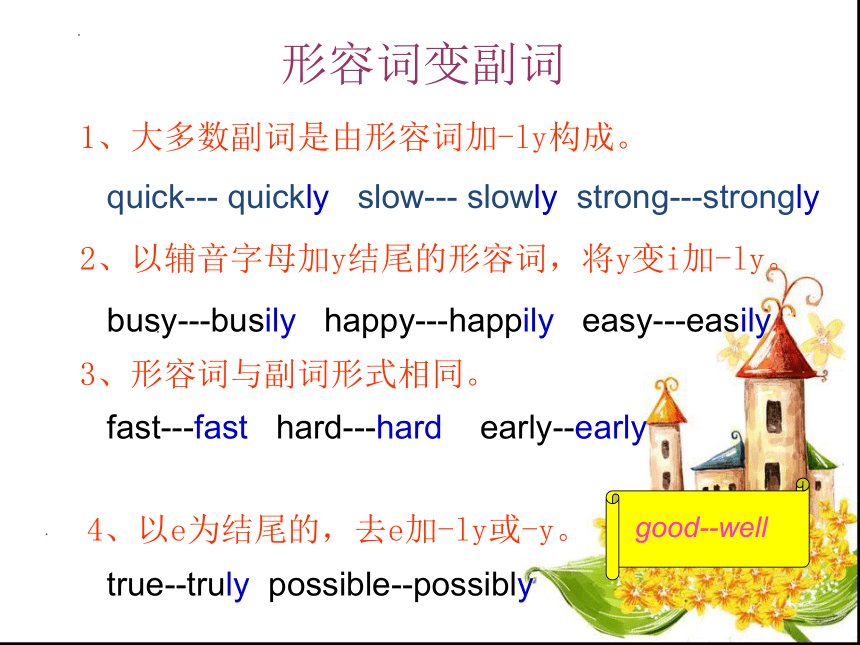
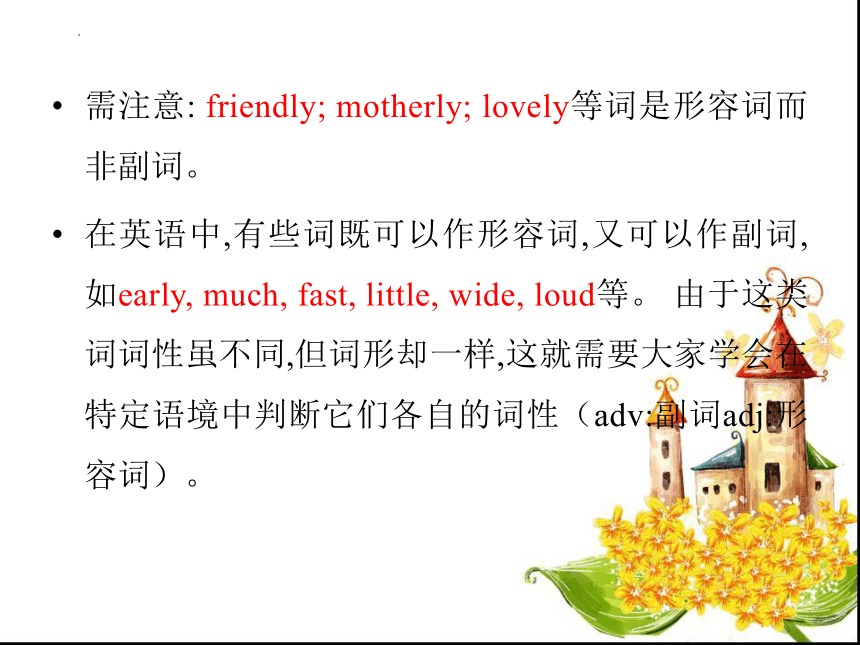
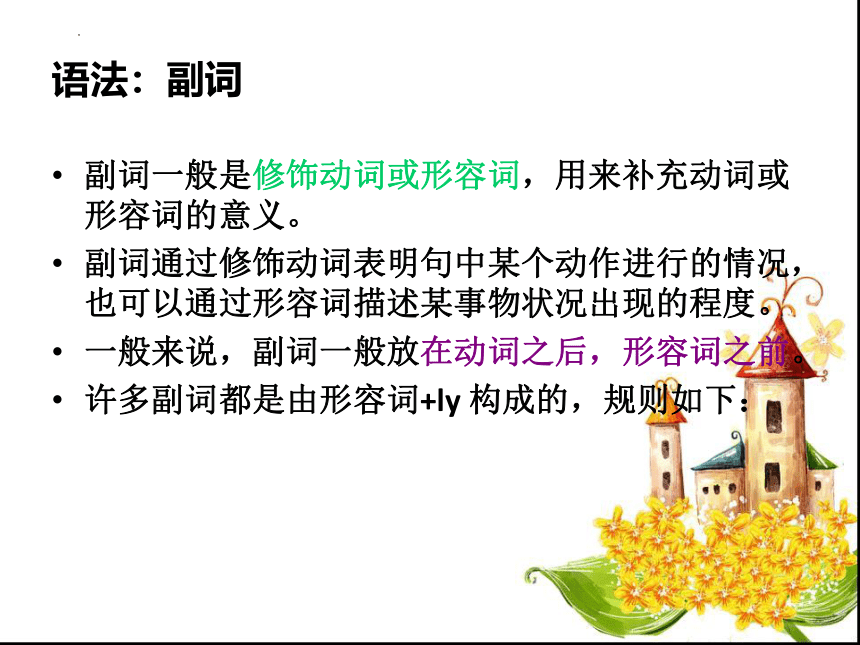
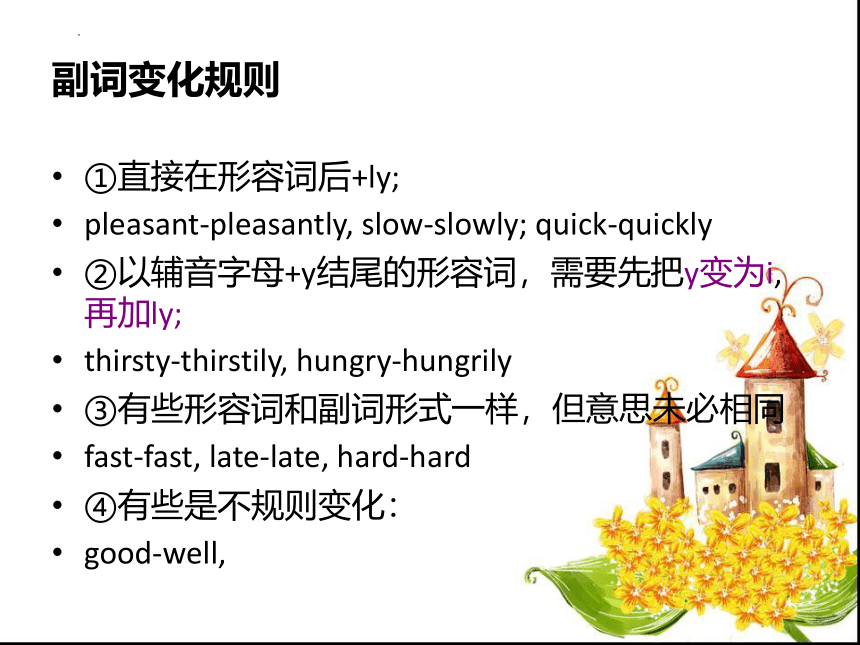
文档简介
(共43张PPT)
Lesson 73 The way to King Street
到国王街的走法
Grammar
1
Vocabulary
2
Text
3
目录
Grammar
时态 用法 动词形式 肯定句 否定句 一般疑问句及其回答 特殊疑问句及其回答
一般现在时 一般、经常、习惯、真理 原形/三单 do/does I do… He does… I don’t do… He doesn’t do … Do you like milk Yes, I do. What do you like
I like milk.
一般过去时 过去某一时 间做了某事 过去式 did I did… He did… I didn’t do… He didn’t do… Did you drink milk Yes, I did. What did you drink
I drank milk.
cut 割;切
cut off 切断;中断;
cut down 削减;砍倒;
cut in 插嘴;超车;插入
cut out 删去;停止;关掉
cut up 切碎;抨击
副词
Suddenly, she saw a man near a bus stop.
她突然在公共汽车站看见一个男人。
The man smiled pleasantly.
这人友好地笑了笑。
He read the phrase slowly.
他缓慢地读着短语。
He is always late.
他总是迟到。
形容词 (翻译成”…的”)
用来修饰名词,表示人或事物的性质和特征,一般放在它所修饰的名词前。
He has a round face and a small nose.
His eyes are very big and blue.
He runs slowly.
The picture is very beautiful.
Suddenly, he saw a man near the bus-stop.
副词 (翻译成”…地”)
用来修饰动词、形容词、其他副词或全句.
观察以下单词有什么特点?
sudden-----suddenly
thirsty-----thirstily
hurried------hurriedly
pleasant------pleasantly
形容词
副词
She sings ____(good).
Please listen to me ________(careful).
carefully
well
形容词变副词
quick--- quickly slow--- slowly strong---strongly
busy---busily happy---happily easy---easily
fast---fast hard---hard early--early
1、大多数副词是由形容词加-ly构成。
2、以辅音字母加y结尾的形容词,将y变i加-ly。
3、形容词与副词形式相同。
true--truly possible--possibly
4、以e为结尾的,去e加-ly或-y。
good--well
需注意: friendly; motherly; lovely等词是形容词而非副词。
在英语中,有些词既可以作形容词,又可以作副词,如early, much, fast, little, wide, loud等。 由于这类词词性虽不同,但词形却一样,这就需要大家学会在特定语境中判断它们各自的词性(adv:副词adj:形容词)。
语法:副词
副词一般是修饰动词或形容词,用来补充动词或形容词的意义。
副词通过修饰动词表明句中某个动作进行的情况,也可以通过形容词描述某事物状况出现的程度。
一般来说,副词一般放在动词之后,形容词之前。
许多副词都是由形容词+ly 构成的,规则如下:
副词变化规则
①直接在形容词后+ly;
pleasant-pleasantly, slow-slowly; quick-quickly
②以辅音字母+y结尾的形容词,需要先把y变为i,再加ly;
thirsty-thirstily, hungry-hungrily
③有些形容词和副词形式一样,但意思未必相同
fast-fast, late-late, hard-hard
④有些是不规则变化:
good-well,
常见副词分类
频率副词 always, often, usually, sometimes, never, once, twice
方式副词 carefully, slowly, well, fast, pleasantly, hurriedly, thirstily..
程度副词 very, much, so(如此)
地点副词 here, there, home(在家)
时间副词 today, yesterday, tomorrow, the day before yesterday, now, just now
选择正确的词填空
You are_____beautiful.(副词,非常/十分)
Please drive _____(slow, slowly).
He can speak English__________(very good, very well)
He ran out of room _______(hurried, hurriedly).
He greeted me________(warm, warmly)
He gave me a ______(warm, warmly)welcome.
very
slowly
very well
warmly
warm
hurriedly
1.Lily doesn't know Hong Kong very well, and she____________last month.
A, lost the way B, losing her way C, lost her way D, lose her way
2.You'd better drive_________at night.
A, slow B, careful C, slowly D, care
3.Excuse me, can you tell me the way__the Big Ben
A, for B, to C, of D, at
4.A: Where____you yesterday afternoon B: I______in the library.
A, is; was B, was; were C, were; was D, was; was
5."How silly of me!" the man said______.
A, to himself B, with him C, for himself D, by him
6.Where's my watch I can't______it.
A, look for B, find C, find out D, look
7.My father ______his hand into the bag, and _____out a story book.
A, putted; taked B, put; take C, put; took D, putting; taking
8.The waiter smiled______and showed me the menu.
A, pleasantly B, friendly C, pleasant D, friend
9.It suddenly started to rain. We ran into the house___.
A, hurry B, hurried C, hurriedly D, in hurry
10.John can speak English_______.
A, very welly B, very goodly C, very good D, very well
nearly和almost的区别
(1) 两者都可用来修饰不定代词、形容词、副词、动词、介词短语等,此时两者常可换用:
He almost [nearly] always arrives late. 他差不多总是迟到。
(2) almost 可用于 any 以及 no, none, nobody, nothing, never 等否定词之前,但 nearly 一般不这样用:
Almost no one came to the party. 几乎没有人来参加晚会。
但是,两者都可用在否定动词之前:
He almost [nearly] didn’t catch the bus. 他差点没赶上公共汽车。
(3) nearly 前可用 very, pretty, not 等词修饰,但 almost 之前不能用这些词:
It’s not nearly so difficult as you think. 这远不像你想像的那么难。
【注】not nearly 意为“远非”, very [pretty] nearly 意为“几乎”,都是习语。
Vocabulary
King's Road 国王街
How much do you know about London
别名: 雾都
行政区类别: 英国首都
所属地区: 大不列颠及北爱尔兰联合王国
面积: 1,577.3平方公里(大伦敦)
人口:
方言: 英语
气候条件: 温带海洋性气候
著名景点: 白金汉宫,威斯敏斯特教堂,
伦敦塔,特拉法加广场,大英博物馆
伦敦2012年奥运会游泳馆
伦敦2012年奥运会主体育馆
London Famous Attractions
(伦敦著名的旅游景点)
The London Eye
伦敦眼
Big Ben 大本钟
The Thames 泰晤士河
British Museum
大英博物馆
London Bridge
伦敦大桥
The London Bus 伦敦公交
week n. 周
London n. 伦敦
suddenly adv. 突然地
bus stop 公共汽车站
smile v. 微笑
pleasantly adv. 愉快地
understand v. 懂,明白
New words and expressions
speak (spoke) v. 讲,说
hand n. 手
pocket n. 衣袋
phrasebook n. 短语手册,常用语手册
phrase n. 短语
slowly adv. 缓慢地
hurriedly adv.匆忙地
cut v.切
thirstily adv.口渴地
go v.走
greet v.问候,打招呼
week n. 周
this week, last week等,前面不能加介词
weekday, weekend
on weekdays
on /at the weekend
on weekends
suddenly
suddenly (adv.)---sudden (adj.)
我突然想起我没有带钥匙。
I suddenly remembered that I didn't bring my key.
smile n. &v. 笑
她从来不笑。
She never smiles.
laugh at 嘲笑
pleasantly adv. 愉快地
pleasant adj. 愉快的,和蔼可亲的
副词修饰动词。
He spoke pleasantly.
understand (understood) v. 懂,明白
我不明白你的意思。
I don’t understand what you mean.
speak (spoke)
speak to/with sb about sth 和某人谈某事
我会和她谈谈这个问题。
I’ll speak to her about the matter.
hand n. 手
raise your hand 举手
wave one’s hand 挥手
give sb. a (big) hand 帮助某人
on the other hand 另一方面
如果有问题,请举手。
If you have any questions, please raise your hand.
当我遇到问题的时候,他总是帮助我。
Whenever I meet a problem, he always gives me a hand.
lose v. (使)迷路
① v. 迷失;(使)迷路
lose one’s way 迷路
② v. 失去;丧失
他在一起汽车交通事故中失明了。
He lost his sight in a car accident.
Text
Watch and answer
Does Mrs. Mills know London well
Read and answer
Where did she see a man
Did the man understand English
Why did the man need a phrasebook
精读文章
1. Last week上周,这个短语奠定了本课是过去时的基础。
2. go to… 去什么地方。go的过去式是went
go to school, go to Beijing, go to the museum
注意:go home, go there(副前不用介词)
3. know sth./sb. very well
对什么东西或什么人很熟悉。
know的过去式是knew
I know him very well.
I don’t know the city very well.
4. lose one’s way 迷路(丢失了某人的路)
lose的过去式是lost
5. She does not know London very well, and she lost her way. 这里的and相当于so。
It rained heavily and we stayed at home.
▲但是要注意,这句话里前一部分是一般事实情况所以用的一般现在时,而后一部分是上周发生的事所以用的过去时。
6. Suddenly 既可以放在句首,也可以放在句中或句末。
7. see的过去式是saw
see:看见,及物动词,强调结果,see sth.
look:看,不及物动词,强调动作,look at sth.
8. near 在附近
扩展:其他方位介词。
9. can 能够。
扩展:其他情态动词。
结构:情态动词+动词原形。
变疑问句时情态动词提前。
I can sing.
→ Can you sing
He can swim.
→ Can he swim
10. ask sb. sth. 问某人某事。ask的过去式是asked
He asked the teacher a question.
11. say的过去式是said
say to oneself 心中暗想(不出声地)
talk to oneself / think aloud 自言自语(小声地)
反身代词:myself, yourself, himself, herself, itself, ourselves, yourselves, themselves
12. Excuse me. 打扰一下,劳驾,请问…(事前)
I’m sorry. 对不起,很抱歉(事后)
13. tell sb. sth. 告诉某人某事。tell的过去式是told
14. the way to… 去某地的路,去某地的走法
the way to Ji’nan / the library/ the nearest post office
15. The man smiled pleasantly. 这里的pleasantly是个副词,修饰动作smile。(第二节课详细讲)
smile的过去式是smiled
16. understand的过去式是understood
17. speak的过去式是spoke
说话的几种表达方法:
speak:说某种语言speak English;同某人通电话speak to sb.
18. is和am的过去式是was,are的过去式是were
19. tour 旅行、旅途
→ tourist 旅行者,旅游的人
21. put的过去式是put,take的过去式是took
put… into… 把…放进…中去
take…out of… 把…从…中取出
He took out a phrasebook.
= He took a phrasebook out of his pocket.
22. open的过去式是opened,
find的过去式是found
23. read /ri:d/的过去式是read /red/
He read the phrase slowly.
这里的slowly是一个副词,修饰动作read。
Lesson 73 The way to King Street
到国王街的走法
Grammar
1
Vocabulary
2
Text
3
目录
Grammar
时态 用法 动词形式 肯定句 否定句 一般疑问句及其回答 特殊疑问句及其回答
一般现在时 一般、经常、习惯、真理 原形/三单 do/does I do… He does… I don’t do… He doesn’t do … Do you like milk Yes, I do. What do you like
I like milk.
一般过去时 过去某一时 间做了某事 过去式 did I did… He did… I didn’t do… He didn’t do… Did you drink milk Yes, I did. What did you drink
I drank milk.
cut 割;切
cut off 切断;中断;
cut down 削减;砍倒;
cut in 插嘴;超车;插入
cut out 删去;停止;关掉
cut up 切碎;抨击
副词
Suddenly, she saw a man near a bus stop.
她突然在公共汽车站看见一个男人。
The man smiled pleasantly.
这人友好地笑了笑。
He read the phrase slowly.
他缓慢地读着短语。
He is always late.
他总是迟到。
形容词 (翻译成”…的”)
用来修饰名词,表示人或事物的性质和特征,一般放在它所修饰的名词前。
He has a round face and a small nose.
His eyes are very big and blue.
He runs slowly.
The picture is very beautiful.
Suddenly, he saw a man near the bus-stop.
副词 (翻译成”…地”)
用来修饰动词、形容词、其他副词或全句.
观察以下单词有什么特点?
sudden-----suddenly
thirsty-----thirstily
hurried------hurriedly
pleasant------pleasantly
形容词
副词
She sings ____(good).
Please listen to me ________(careful).
carefully
well
形容词变副词
quick--- quickly slow--- slowly strong---strongly
busy---busily happy---happily easy---easily
fast---fast hard---hard early--early
1、大多数副词是由形容词加-ly构成。
2、以辅音字母加y结尾的形容词,将y变i加-ly。
3、形容词与副词形式相同。
true--truly possible--possibly
4、以e为结尾的,去e加-ly或-y。
good--well
需注意: friendly; motherly; lovely等词是形容词而非副词。
在英语中,有些词既可以作形容词,又可以作副词,如early, much, fast, little, wide, loud等。 由于这类词词性虽不同,但词形却一样,这就需要大家学会在特定语境中判断它们各自的词性(adv:副词adj:形容词)。
语法:副词
副词一般是修饰动词或形容词,用来补充动词或形容词的意义。
副词通过修饰动词表明句中某个动作进行的情况,也可以通过形容词描述某事物状况出现的程度。
一般来说,副词一般放在动词之后,形容词之前。
许多副词都是由形容词+ly 构成的,规则如下:
副词变化规则
①直接在形容词后+ly;
pleasant-pleasantly, slow-slowly; quick-quickly
②以辅音字母+y结尾的形容词,需要先把y变为i,再加ly;
thirsty-thirstily, hungry-hungrily
③有些形容词和副词形式一样,但意思未必相同
fast-fast, late-late, hard-hard
④有些是不规则变化:
good-well,
常见副词分类
频率副词 always, often, usually, sometimes, never, once, twice
方式副词 carefully, slowly, well, fast, pleasantly, hurriedly, thirstily..
程度副词 very, much, so(如此)
地点副词 here, there, home(在家)
时间副词 today, yesterday, tomorrow, the day before yesterday, now, just now
选择正确的词填空
You are_____beautiful.(副词,非常/十分)
Please drive _____(slow, slowly).
He can speak English__________(very good, very well)
He ran out of room _______(hurried, hurriedly).
He greeted me________(warm, warmly)
He gave me a ______(warm, warmly)welcome.
very
slowly
very well
warmly
warm
hurriedly
1.Lily doesn't know Hong Kong very well, and she____________last month.
A, lost the way B, losing her way C, lost her way D, lose her way
2.You'd better drive_________at night.
A, slow B, careful C, slowly D, care
3.Excuse me, can you tell me the way__the Big Ben
A, for B, to C, of D, at
4.A: Where____you yesterday afternoon B: I______in the library.
A, is; was B, was; were C, were; was D, was; was
5."How silly of me!" the man said______.
A, to himself B, with him C, for himself D, by him
6.Where's my watch I can't______it.
A, look for B, find C, find out D, look
7.My father ______his hand into the bag, and _____out a story book.
A, putted; taked B, put; take C, put; took D, putting; taking
8.The waiter smiled______and showed me the menu.
A, pleasantly B, friendly C, pleasant D, friend
9.It suddenly started to rain. We ran into the house___.
A, hurry B, hurried C, hurriedly D, in hurry
10.John can speak English_______.
A, very welly B, very goodly C, very good D, very well
nearly和almost的区别
(1) 两者都可用来修饰不定代词、形容词、副词、动词、介词短语等,此时两者常可换用:
He almost [nearly] always arrives late. 他差不多总是迟到。
(2) almost 可用于 any 以及 no, none, nobody, nothing, never 等否定词之前,但 nearly 一般不这样用:
Almost no one came to the party. 几乎没有人来参加晚会。
但是,两者都可用在否定动词之前:
He almost [nearly] didn’t catch the bus. 他差点没赶上公共汽车。
(3) nearly 前可用 very, pretty, not 等词修饰,但 almost 之前不能用这些词:
It’s not nearly so difficult as you think. 这远不像你想像的那么难。
【注】not nearly 意为“远非”, very [pretty] nearly 意为“几乎”,都是习语。
Vocabulary
King's Road 国王街
How much do you know about London
别名: 雾都
行政区类别: 英国首都
所属地区: 大不列颠及北爱尔兰联合王国
面积: 1,577.3平方公里(大伦敦)
人口:
方言: 英语
气候条件: 温带海洋性气候
著名景点: 白金汉宫,威斯敏斯特教堂,
伦敦塔,特拉法加广场,大英博物馆
伦敦2012年奥运会游泳馆
伦敦2012年奥运会主体育馆
London Famous Attractions
(伦敦著名的旅游景点)
The London Eye
伦敦眼
Big Ben 大本钟
The Thames 泰晤士河
British Museum
大英博物馆
London Bridge
伦敦大桥
The London Bus 伦敦公交
week n. 周
London n. 伦敦
suddenly adv. 突然地
bus stop 公共汽车站
smile v. 微笑
pleasantly adv. 愉快地
understand v. 懂,明白
New words and expressions
speak (spoke) v. 讲,说
hand n. 手
pocket n. 衣袋
phrasebook n. 短语手册,常用语手册
phrase n. 短语
slowly adv. 缓慢地
hurriedly adv.匆忙地
cut v.切
thirstily adv.口渴地
go v.走
greet v.问候,打招呼
week n. 周
this week, last week等,前面不能加介词
weekday, weekend
on weekdays
on /at the weekend
on weekends
suddenly
suddenly (adv.)---sudden (adj.)
我突然想起我没有带钥匙。
I suddenly remembered that I didn't bring my key.
smile n. &v. 笑
她从来不笑。
She never smiles.
laugh at 嘲笑
pleasantly adv. 愉快地
pleasant adj. 愉快的,和蔼可亲的
副词修饰动词。
He spoke pleasantly.
understand (understood) v. 懂,明白
我不明白你的意思。
I don’t understand what you mean.
speak (spoke)
speak to/with sb about sth 和某人谈某事
我会和她谈谈这个问题。
I’ll speak to her about the matter.
hand n. 手
raise your hand 举手
wave one’s hand 挥手
give sb. a (big) hand 帮助某人
on the other hand 另一方面
如果有问题,请举手。
If you have any questions, please raise your hand.
当我遇到问题的时候,他总是帮助我。
Whenever I meet a problem, he always gives me a hand.
lose v. (使)迷路
① v. 迷失;(使)迷路
lose one’s way 迷路
② v. 失去;丧失
他在一起汽车交通事故中失明了。
He lost his sight in a car accident.
Text
Watch and answer
Does Mrs. Mills know London well
Read and answer
Where did she see a man
Did the man understand English
Why did the man need a phrasebook
精读文章
1. Last week上周,这个短语奠定了本课是过去时的基础。
2. go to… 去什么地方。go的过去式是went
go to school, go to Beijing, go to the museum
注意:go home, go there(副前不用介词)
3. know sth./sb. very well
对什么东西或什么人很熟悉。
know的过去式是knew
I know him very well.
I don’t know the city very well.
4. lose one’s way 迷路(丢失了某人的路)
lose的过去式是lost
5. She does not know London very well, and she lost her way. 这里的and相当于so。
It rained heavily and we stayed at home.
▲但是要注意,这句话里前一部分是一般事实情况所以用的一般现在时,而后一部分是上周发生的事所以用的过去时。
6. Suddenly 既可以放在句首,也可以放在句中或句末。
7. see的过去式是saw
see:看见,及物动词,强调结果,see sth.
look:看,不及物动词,强调动作,look at sth.
8. near 在附近
扩展:其他方位介词。
9. can 能够。
扩展:其他情态动词。
结构:情态动词+动词原形。
变疑问句时情态动词提前。
I can sing.
→ Can you sing
He can swim.
→ Can he swim
10. ask sb. sth. 问某人某事。ask的过去式是asked
He asked the teacher a question.
11. say的过去式是said
say to oneself 心中暗想(不出声地)
talk to oneself / think aloud 自言自语(小声地)
反身代词:myself, yourself, himself, herself, itself, ourselves, yourselves, themselves
12. Excuse me. 打扰一下,劳驾,请问…(事前)
I’m sorry. 对不起,很抱歉(事后)
13. tell sb. sth. 告诉某人某事。tell的过去式是told
14. the way to… 去某地的路,去某地的走法
the way to Ji’nan / the library/ the nearest post office
15. The man smiled pleasantly. 这里的pleasantly是个副词,修饰动作smile。(第二节课详细讲)
smile的过去式是smiled
16. understand的过去式是understood
17. speak的过去式是spoke
说话的几种表达方法:
speak:说某种语言speak English;同某人通电话speak to sb.
18. is和am的过去式是was,are的过去式是were
19. tour 旅行、旅途
→ tourist 旅行者,旅游的人
21. put的过去式是put,take的过去式是took
put… into… 把…放进…中去
take…out of… 把…从…中取出
He took out a phrasebook.
= He took a phrasebook out of his pocket.
22. open的过去式是opened,
find的过去式是found
23. read /ri:d/的过去式是read /red/
He read the phrase slowly.
这里的slowly是一个副词,修饰动作read。
同课章节目录
